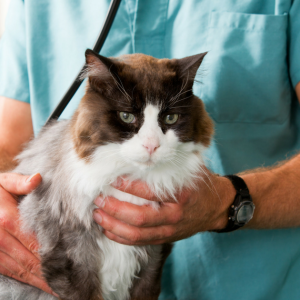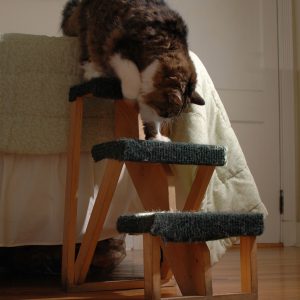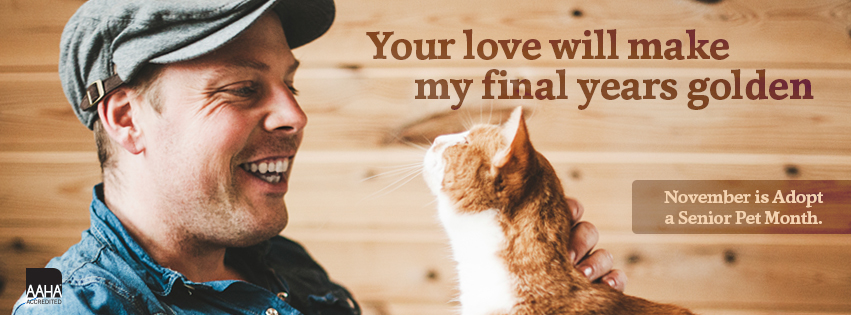Apr 06 2018
Senior Cat Care
Home » News » Senior Cat Care
From routine visits to your veterinarian to preparing for changing needs, ensure your senior cat’s golden years are the best yet with these helpful tips.
1. Schedule Regular Wellness Check-ups.
- Develop a close relationship with your cat’s veterinarian while your cat is still healthy. This way they get to know your cat and can detect subtle changes that may indicate a health condition or disease.
- Cats need to visit their veterinarian more often as they age, usually about every 6 months, even if your cat appears healthy. Please remember that 6 months in cat years is roughly equivalent to 2 years for a person and a lot can change in that time.
2. Set Your Senior Cat Up for Success at the Veterinarian.
- Reduce the stress of veterinary visits by getting your cat comfortable with her carrier. Make the carrier cozy with soft, familiar bedding. This makes it easier to get your cat into the carrier on the day of your appointment.
- Leave plenty of time to arrive so you are unhurried and calm.
- Ask if they have a cat-only waiting area, cat concierge service, or if you can go directly to the waiting area. This helps keep your cat calm.
- Prepare a list of questions or concerns to ask your veterinarian at your cat’s regular check-up.
3. Learn Your Cat’s Habits and Pay Attention to Changes.
- Cats are masters at hiding illness. Signs are often subtle and easily missed.
- If you notice a difference in behavior, such as sleeping more or hiding, don’t ignore it! Speak up and tell your veterinarian.
- It can be helpful to keep a diary to track of appetite, vomiting, and bowel movements.
- Tell your veterinarian about any changes in your cat’s behavior even if they are minor. You know your cat and his routines better than anyone.
4. Beware of Changes in Weight.
- Both weight gain AND unplanned weight loss requires a visit to the veterinarian.
- Weight gain can make your cat more likely to get chronic diseases and have a shortened life span.
- Weight loss in senior cats is usually a sign that something is wrong. Some of the most common diseases causing weight loss – hyperthyroidism, intestinal disease, and diabetes – occur with a normal or even increased appetite.
- Gradual changes in weight are hard to notice. Monitoring your cat’s weight is one of the most important reasons for routine examinations by your veterinarian.
5. They’re Not Just “Slowing Down.”
- Slowing down is often a sign of underlying discomfort or pain.
- Arthritis, or degenerative joint disease, is present in most older cats. Appropriate treatment can help them remain active and engaged.
- If your cat has difficulty going up or down steps, does not jump like he used to, or isn’t using the litter box, talk with your veterinarian.
6. Look When You Scoop.
- Are your cat’s stools softer, harder, or changing color? Is she defecating daily? Constipation is a common, yet under recognized sign of dehydration in older cats. If attended to early, your veterinarian can help your kitty feeling comfortable again.
- Has the amount of urine in the litter box changed? Increased urine output can signal some of the most common illnesses in elderly cats – from diabetes or an over active thyroid gland to kidney disease and high blood pressure.
7. Take a “Cat’s Eye View” of the Litter box.
- If your cat starts to miss the litter box and or have “accidents” around your house, there may be a medical issue causing your cat to house-soil.
- Urinary infections, constipation, arthritis, and muscle weakness are just a few of the reasons an older cat can develop litter box issues.
- Your veterinarian can evaluate the various medical issues and help you address home or environmental concerns that may be contributing to the change in your cat’s behavior.
- Is the litter box easy for your elderly cat to get into (i.e. there isn’t a high step into the box)?
- Does the location of the litter box make it easy for your cat to access so they don’t have to go up or down stairs?
- Is the litter box in an quiet area that is protected from other pets that may startle or frighten your older cat?
- Are you scooping and cleaning the litter box often enough to keep up with that increased urine output?
- Is the litter gentle on your senior kitty’s paws?
8. Know That Your Cat’s Needs Will Change.
- You will need to make some adjustments in your household for your senior cat.
- As cats grow older, they often need extra padding and warmth for comfort, so provide soft sleeping places. Make their preferred sleeping and resting spots easily accessible by using stepping stools, ramps, and other ways to assist.
9. Know How Much Your Cat is Eating.
- Nutritional needs change with chronic diseases and for some healthy older cats as well. Discuss nutrition with your cat’s veterinarian and get recommendations for your cat.
- Cat caregivers are often unaware of how much their cat is actually eating on a daily basis, especially in households with multiple cats.
- Monitor food intake so you know immediately if your cat is eating less. This helps your veterinarian intervene when there are problems.
10. Enjoy Your Special Bond.
- Bonds with our older companions are special and we rely on our cats as much as they rely on us. Elderly cats often crave more attention than they had earlier in life.
- Continue to provide physical and mental stimulation by petting, playing, and interacting in your special ways.
- Help out with grooming by gently brushing or combing, and keep nails from becoming overgrown with regular nail trims. The nails of older arthritic cats sometimes overgrow into the paw pads, and this is painful.




